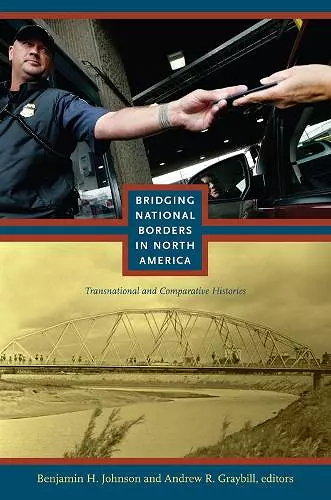Bridging National Borders in North America
Transnational and Comparative Histories
Benjamin Johnson editor Andrew R Graybill editor
Format:Hardback
Publisher:Duke University Press
Published:7th Apr '10
Currently unavailable, and unfortunately no date known when it will be back

Collection attempts to put historians of the U.S.-Mexico and U.S.-Canadian borderlands of North America into dialogue, exploring similarities, differences, and the transnational potentials of these two historiographies.
A collection of essays by historians of the Canadian-U.S. border region and those focused on the Mexican-U.S. border, examining borderlands events and phenomena from the mid-nineteenth century through the mid-twentieth.Despite a shared interest in using borders to explore the paradoxes of state-making and national histories, historians of the U.S.-Canada border region and those focused on the U.S.-Mexico borderlands have generally worked in isolation from one another. A timely and important addition to borderlands history, Bridging National Borders in North America initiates a conversation between scholars of the continent’s northern and southern borderlands. The historians in this collection examine borderlands events and phenomena from the mid-nineteenth century through the mid-twentieth. Some consider the U.S.-Canada border, others concentrate on the U.S.-Mexico border, and still others take both regions into account.
The contributors engage topics such as how mixed-race groups living on the peripheries of national societies dealt with the creation of borders in the nineteenth century, how medical inspections and public-health knowledge came to be used to differentiate among bodies, and how practices designed to channel livestock and prevent cattle smuggling became the model for regulating the movement of narcotics and undocumented people. They explore the ways that U.S. immigration authorities mediated between the desires for unimpeded boundary-crossings for day laborers, tourists, casual visitors, and businessmen, and the restrictions imposed by measures such as the Chinese Exclusion Act of 1882 and the 1924 Immigration Act. Turning to the realm of culture, they analyze the history of tourist travel to Mexico from the United States and depictions of the borderlands in early-twentieth-century Hollywood movies. The concluding essay suggests that historians have obscured non-national forms of territoriality and community that preceded the creation of national borders and sometimes persisted afterwards. This collection signals new directions for continental dialogue about issues such as state-building, national expansion, territoriality, and migration.
Contributors: Dominique Brégent-Heald, Catherine Cocks, Andrea Geiger, Miguel Ángel González Quiroga, Andrew R. Graybill, Michel Hogue, Benjamin H. Johnson, S. Deborah Kang, Carolyn Podruchny, Bethel Saler, Jennifer Seltz, Rachel St. John, Lissa Wadewitz
Published in cooperation with the William P. Clements Center for Southwest Studies, Southern Methodist University.
“Johnson and Graybill have done an amazing job bringing the study of the U.S.-Canadian and U.S.-Mexican borderlands into one volume.” - Elliott Young, Journal of American History
“This top-quality and thought-provoking study, in the reviewer’s opinion, will become required reading in borderland courses.” - Dirk Hoerder, Canadian Historical Review
“All of the offerings in this collection reflect skillful exposition, thoughtful analysis, and careful scholarship. Representing a broad range of topics from the mid-nineteenth to the mid-twentieth century, they provide a solid foundation and point of departure for further research in an area of intellectual inquiry that should become an increasingly important focus of attention of scholars in the future.” - Michael M. Smith, Southwestern Historical Quarterly
“A continental approach to transnational history, or the historians respond to NAFTA! These highly engaging original essays by emerging scholars tell new stories or re-cast old ones about the US-Mexico and US-Canada borderlands and border-making. Borderland studies of the north and the south presented in one volume facilitates cross-fertilization across previously isolated fields of inquiry, and illuminates the possibility of an integrated and comprehensive approach to the study of North America’s past beyond the familiar national histories of the three nation-states. These essays go a long way towards breaking down US-centric narratives about relationships with their political neighbors; they compel us to continue to seek out Canadian and Mexican perspectives on the fact and concept of living on and across the borders.”—Evelyn Hu-DeHart, Brown University
“These essays stand at the cutting edge of historical scholarship about the borders that are at the edges of nations. Bringing into conversation and comparison the U.S.-Mexico and U.S.-Canada boundaries, this splendid collection offers a new approach to the nation-states of North America by showing us how to think across borders and beyond nations.”—Stephen Aron, UCLA
“All of the offerings in this collection reflect skillful exposition, thoughtful analysis, and careful scholarship. Representing a broad range of topics from the mid-nineteenth to the mid-twentieth century, they provide a solid foundation and point of departure for further research in an area of intellectual inquiry that should become an increasingly important focus of attention of scholars in the future.” -- Michael M. Smith * Southwestern Historical Quarterly *
“Johnson and Graybill have done an amazing job bringing the study of the U.S.-Canadian and U.S.-Mexican borderlands into one volume.” -- Elliott Young * Journal of American History *
“This top-quality and thought-provoking study, in the reviewer’s opinion, will become required reading in borderland courses.” -- Dirk Hoerder * Canadian Historical Review *
ISBN: 9780822346883
Dimensions: unknown
Weight: 676g
384 pages